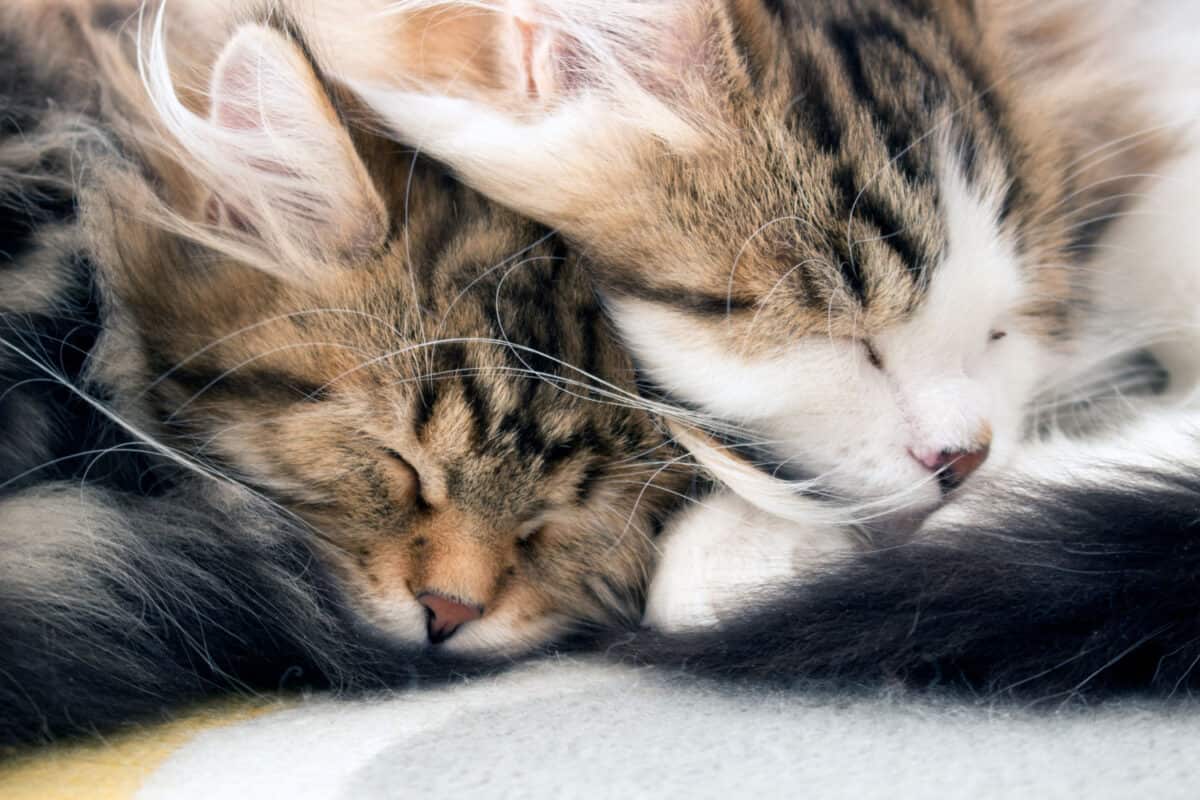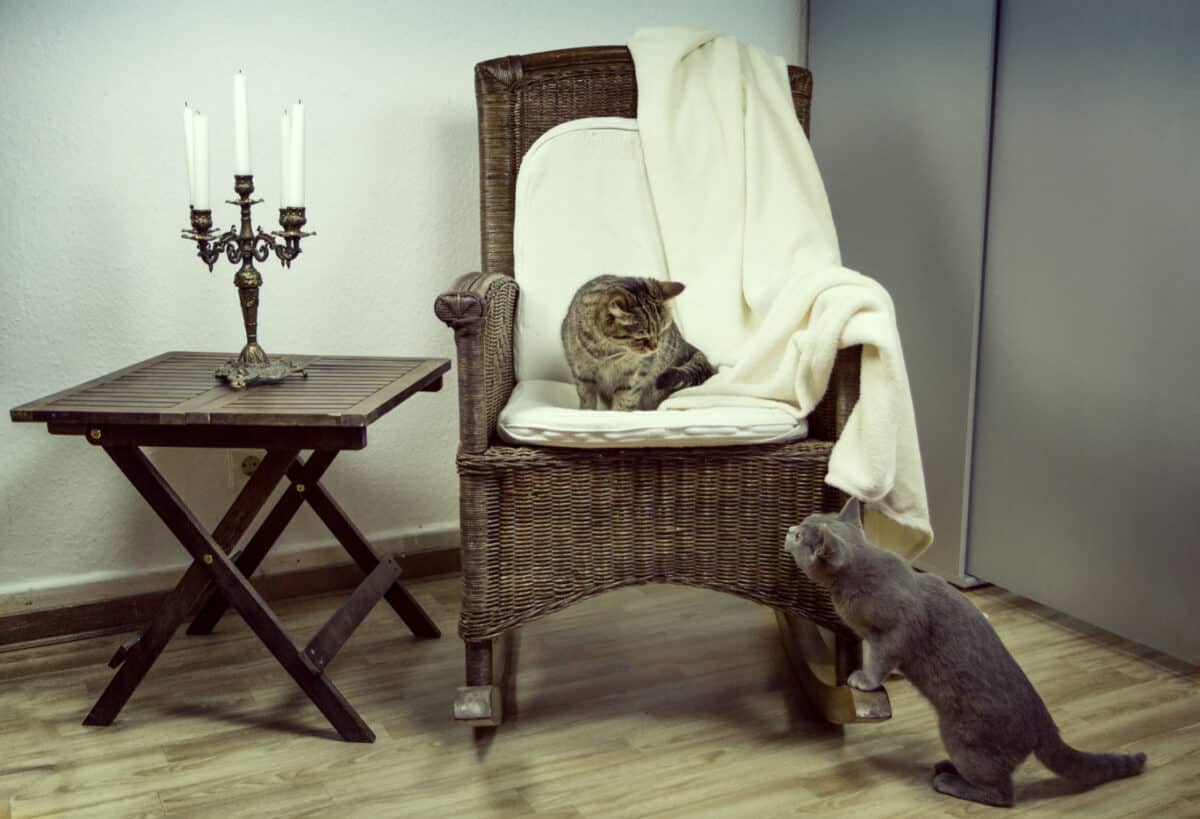Introducing a new cat into your home can be as daunting as it is exciting. After all, how do you convince your beloved pet to accept a new companion? No need to fret. Our Ultimate Guide will teach you how to successfully introduce cats.
Bringing a second, third, or even fourth cat into your home is not a decision to be taken lightly. It demands time, patience, and a proper introduction plan. Without it, things can quickly turn sour.
Your new pet might feel like an intruder, the existing one may become territorial, and your dream of a harmonious, cat-filled household might seem out of reach. But it doesn't have to be that way.
We're going to discuss why it's vital to introduce your new cat correctly, explaining what to expect during this crucial period. This guide will also provide you with the key principles of cat introductions, from scent and visual desensitization to techniques like gradual exposure and creating positive associations.
You'll also discover the crucial role that your own behavior plays during the process, how to handle setbacks, and even how to determine when to advance to the next stage.
So, whether you're bringing a new cat home out of love, for companionship, or because they've simply chosen you, our article will guide you through the sometimes choppy waters of cat introductions. We won't promise it'll be easy, but we guarantee you're in for a rewarding journey.

Why Add Another Cat?
Ever heard the phrase, "Cats are like chips, you can't stop at one"? It's a sentiment echoed by many of our members. The allure of adding another soft, purring pet to your home is often irresistible.
Whether it's the joy of having more furry companions, the desire to give your existing pet a friend, or an unexpected adoption by a new cat, there are many reasons why you might decide to bring home another pet. But remember, every new cat requires a proper introduction to your home and your resident cat.
Challenges of Introducing a New Cat
Let's be real: introducing a new cat is not a walk in the park. Cats, by nature, are territorial creatures. The introduction of a newcomer can be a stressful event for both the resident and the new cat.
Fear often drives cats into hiding. In other cases, they might respond aggressively, treating the newcomer as an intruder. Such stressful interactions can result in behavioral issues like territorial spraying. All this can make achieving a peaceful coexistence quite tricky.
The Importance of Proper Introduction
The moral of the story? Don't underestimate the importance of a proper introduction when bringing a new cat home. This isn't a situation where you can simply throw them together and hope they become fast friends. It's your responsibility to manage this process delicately, ensuring a gradual and patient introduction.
Patience and Time are Key
In short, managing multiple cats in a household requires careful consideration and a well-executed introduction strategy. This process might feel daunting, but remember, a successful introduction lays the foundation for a harmonious multi-cat home. Every minute you invest in this stage will pay off in the long run.

Setting the Expectations
Speaking of desired results, we all want our cats to be best friends. When bringing in a new cat, especially when the motivation is to provide the resident cat with a companion, most owners visualize something like this -

It certainly can happen. However, it doesn't have to. Sometimes, even with the best of introductions, cats just don't like each other. Just like humans, they have their own personalities and temperament which do not always match up. Imagine if someone brought a stranger to live with you.
It's possible that you'll become best friends, but it's also entirely possible that you never will. You may just not be a good match for each other. The best you can hope for in such cases, with humans, or cats, is to avoid fights and aggressive behavior and for both cats to tolerate each other's presence, at least most of the time.
You can increase the chances of finding a good feline friend for your resident cat by trying to find the right match for him or her. Read more about choosing the right cat and remember to keep your expectations reasonable.
SIGN UP FOR THECATSITE'S EMAIL UPDATES >
Before We Start
Before any introductions can begin you have to bring home the new cat. That's not as simple as it may sound. You need to prepare a sanctuary room where the new cat can spend the first few weeks in peace, away from the resident cats. Read more about bringing home a new cat and follow the advice given for setting up the newcomer's room.
Make sure both cats are healthy and free of parasites before introducing them to each other. The new cat should be seen by a vet and infectious diseases need to be ruled out before you bring him or her home.
Give the new cat a few days to settle in. The move itself created plenty of stress as it is, so there's no need to add the stress of introduction sessions at this point. That said, be aware that the introduction process has in fact begun. The cats will smell each other off you and possibly through the closed door.
If one of the cats is vocal, that's another way for them to learn about each other's existence. That's fine for now but don't try to bring them together just yet. Wait for the new cat to adjust to his or her new surroundings first.
During these first days, make sure you bond with the new cat, but don't neglect the resident cat. There is no need to comfort the resident cat, just keep up with your regular routine of food, treats, and playtime.
Be calm and casual and don't be alarmed if the resident cat hangs around the door of the newcomer's room, possibly displaying signs of aggression. It's perfectly natural. Just make sure he or she doesn't get into the room by accident as you step in and out.
The Key Principles of Cat Introductions:
Desensitization through Gradual Exposure and Positive Association
There are many techniques for introducing cats. They are all based on the same principle:
Desensitizing the cats to each other's presence so they no longer feel threatened.
This is achieved by:
1. Making the exposure gradual.
Gradual exposure decreases the cat's "fight or flight" responses in the presence of an intruder, to the point that it is no longer triggered and he or she can learn to accept the presence of another cat in their territory.
2. Creating positive associations.
Many techniques rely on distracting the cat with positive stimuli while in the presence of the other cat. This creates a positive association with the other cat, reducing aggression levels.
While on the subject of positive associations: Make sure you don't end up creating any negative associations during the introduction process. No matter what the cats do, or how the process goes, keep your tone of voice calm and avoid scaring the cats in any way.
Introduction Techniques
The following techniques utilize at least one of the principles detailed above and sometimes both.
1. Scent Desensitization
Scent is central to your cat's perception of the world. Take a clean sock and put it on your hand, then pet the new cat with your sock-clad hand. Focus on rubbing the cat's face, chin, and cheeks. You are in fact lacing the sock with the scent of that cat. Next, leave the newcomer's room and return to your resident cat's "territory".
Place the sock within the cat's reach. Don't call the cat over or initiate any interaction with the sock. Allow the resident cat time to find the sock and investigate the new smell. He or she may react with fear or aggression. Just let the cat be and make sure the environment around them is calm (yourself included!)
Do the same thing with the opposite setup. Use a clean sock (not the same one!) to soak up the scent from the resident cat, and place that sock in the newcomer's room.
Repeat this once a day for several days, until you see a reduction in both cats' reactions to the socks. If your cat is a fan of treats, you could try and offer one as she's sniffing the sock to create a positive association with the scent.
2. Visual Desensitization
Once both cats are desensitized to scents, you can move on to the next sense: vision. The challenge here is to allow the cats to view each other, without letting them engage in direct physical contact.
Cat behaviorist Pam Johnson-Bennett suggests using three baby gates, one on top of the other, to create a gate the size of your door which you can use as an additional door to the new cat's room.
A screen door works too. Behaviorist Jackson Galaxy suggests sticking with the regular door and just opening it up a crack, allowing the cats to view each other in a controlled way.
Here are a couple of images by our members showing how they created barriers between the cats which still allow for visual exposure -
@katiecatTPP blocked off one room using a stack of baby gates:

While our member and advisor @shadowsrescue secured a screen door using tension rods -

Allow the two cats to see each other. Don't be alarmed if they show aggression, and stay calm. You can use treats to make the session more pleasant. Jackson Galaxy even suggests feeding the cats when in this situation.
According to his method, you should limit feeding to the times when the cats see each other through the crack in the door, placing their food dishes far away at first, and bringing the dishes closer every day.
3. Interactive Playtime & Treats
You can vary introduction techniques a little bit, and change them based on what you know about your own cats. Some cats couldn't care less about food or treats when they see another cat and may prefer playtime instead.
Remember the principles behind the techniques and you should be ok. If need be, create a positive association through interactive playtime with your cat. Read more on how to conduct playtime sessions with your cat.
Keep in mind that some cats may be extremely tense in the presence of a cat they don't know or trust. Whether playing or providing treats, stay in control of the interaction and don't allow them to come into physical contact too soon.
Watch out for re-directed aggression as well. A cat may become all worked up over the other cat's presence and lash out at you with no warning. When playing during introduction sessions, keep your hands out of reach and use only fishing-rod toys.

How Long Should This Take?
It really is hard to predict. A lot depends on both cats' temperaments. Generally speaking, it's much easier to introduce kittens to each other than adult cats. Some adult cats are very cat-friendly and will gladly accept the company of a new cat. Others may always prefer to be the only cat in the house and never fully accept another cat's presence.
As you move forward with introductions, watch the cats' body language and try to assess their cues. Don't move forward before both cats are calm. It's better to take a few more days before moving on to the next stage than risk a catfight.
Concluding Thoughts: Embrace the Journey of Cat Introductions
The journey of introducing a new cat to your household can seem like a mountain climb. It's a delicate process that requires an understanding of cat behavior, a well-thought-out introduction plan, and a lot of patience. But with each step you take, remember that you're laying the foundation for a harmonious multi-cat household.
What's crucial is not to rush the process. Every cat is unique, with their own temperaments, quirks, and acceptance times. So, take the time to observe their body language and reactions. Only progress when they're ready.
Despite the best of introductions, it's important to remember that just like humans, cats too have their own personalities. They may not always become the best of friends, but with patience and a calm demeanor, you can foster a peaceful co-existence.
Lastly, this guide should be a roadmap, not a rulebook. Feel free to adapt the strategies based on your own and your cats' unique needs. Remember, the aim is to reduce the stress of the situation and encourage a peaceful introduction, however that best works for your cats.
Embrace this journey, for it can be as rewarding as it is challenging. Stay patient, keep your expectations realistic, and remember to enjoy every moment. After all, isn't that why we love cats in the first place - for all the unexpected joys they bring into our lives?
SIGN UP FOR THECATSITE'S EMAIL UPDATES >
Comments? Leave them using the form below. Questions? Please use the cat forums for those!
Note: We may get commissions for purchases made through links on this page.




36 comments on “How To Successfully Introduce Cats [The Ultimate Guide]”